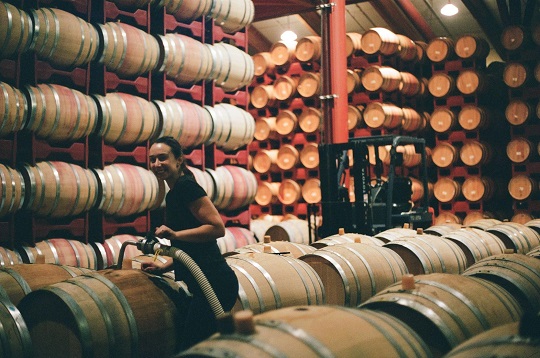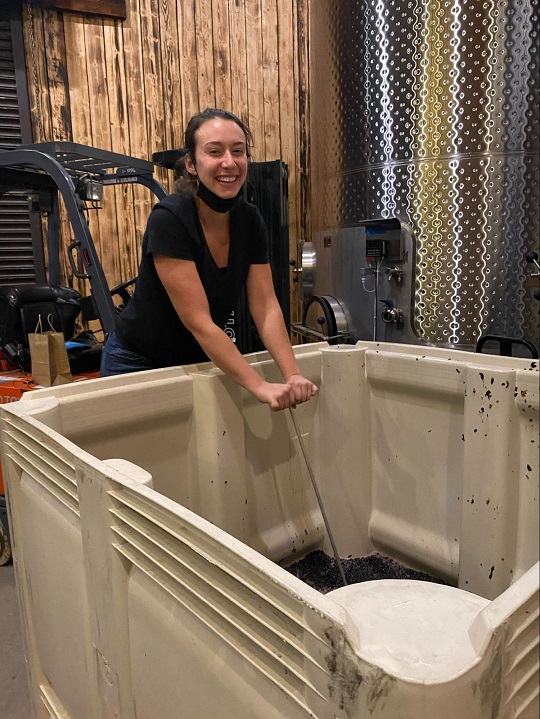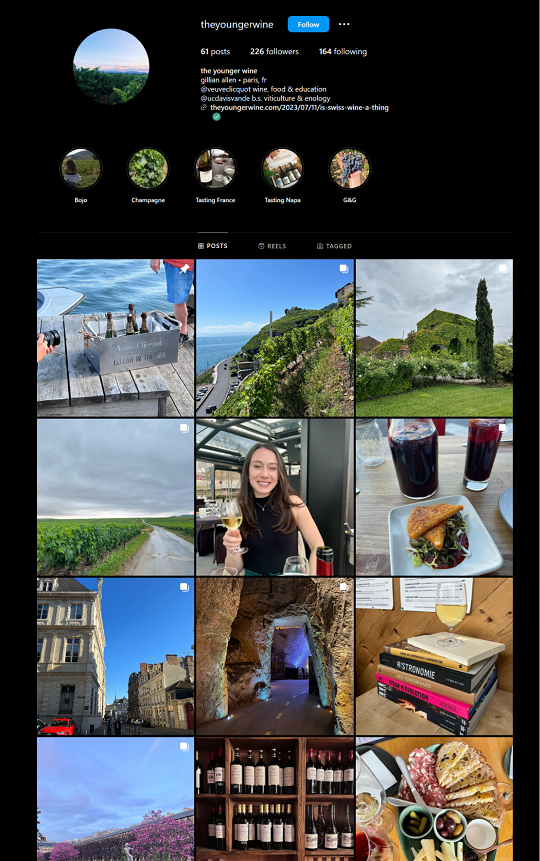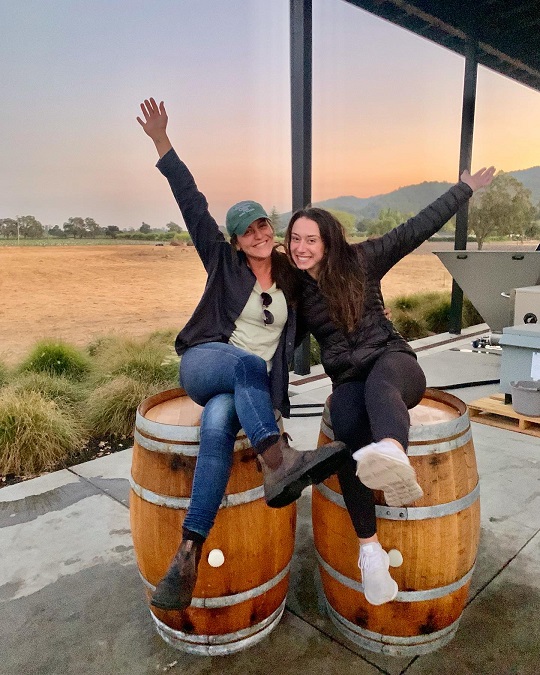Super Early Bird Ends
30 April 2025
Warehouse Deadline
30 Sep 2025
Judging Dates
7 October 2025
Winners Announcement
28 October 2025

Gillian Allen, I am a wine writer and technically-trained winemaker with a Bachelor of Science in Viticulture and Enology from the University of California, Davis. After graduation, I spent three years working in winemaking at Cakebread Cellars in Napa Valley, which provided an invaluable hands-on education. I recently received my Masters in Luxury Wine Management in Paris and am now the Assistant Global Manager of Wine, Food and Education at Veuve Clicquot in Paris.
My grandfather liked to attribute my gravitation towards wine to my Sicilian ancestors who grew wine grapes and vinified them, but truly I fell into wine at UC Davis when I was looking for a program that would allow me to combine my love of the natural sciences with art and creativity. The wine program was perfect for that.
My sophomore year of college I spent the summer in Dijon, traveling around with my class and learning about Bourgogne. Tasting the wines on site with the winemakers or proprietors will always be one of the best learning experiences I've had. After this program I was completely enamored with the wine industry.

Gillian filling barrels at Cakebread Cellars, Picture Credit: Erin Regan
Access to wine education, history and knowledge - Like in many Old World wine regions, wine is so ingrained in the culture in France. It’s a much larger part of the daily lifestyle. It’s great to be able to learn from vintners whose families have been growing wine for generations, and to see their perspective on how the industry is changing.
Access to a better price to quality ratio - Living here, I am able to taste many wines that I would otherwise not have the chance to if I were living in the US. Many great French wines are not exported to the US, and if they were they might be much more expensive. Generally, here you can find hundreds of wines in the €15 to €20 price range for a more ideal price-to-quality ratio. As an added bonus, because you’re drinking locally, oftentimes the wine goes through less treatment and harsh travel conditions before it gets to your glass.
And, of course, the amazing food that goes so well with all of the wine! The terroir doesn’t only apply to the wine but also to the food, and I think it’s important to enjoy the two together. I’m constantly feeling inspired to try new wines to pair with the fresh ingredients.
The language was a big learning curve. I had a basic knowledge of French when I moved here, but I really had to push myself out of my comfort zone. I knew that in order to truly immerse myself in the French wine business, I would have to be able to contribute professionally and express my credibility. During my Master’s program I actually got a job at a wine bar to force myself to speak French everyday.
From my experience, consumption in the US is more about the experience in the moment. We make a big deal about individual wine experiences compared to wine being more integrated into everyday life. For example, people plan huge wine tasting weekends in wine country, and then return home and go about their lives. Most people will never visit those producers again or maintain relationships with the brands. However, tapping into those relationships can be key to a successful wine business.
I studied viticulture and enology at UC Davis because I knew that I wanted to make wine, and that definitely helped me get my previous job in winemaking in Napa Valley. However, I know of very successful winemakers who don’t have a formal wine education but have instead trained through work experience and apprenticeships. I also wanted to learn about the luxury wine business so I moved to France to pursue a Master’s degree in Luxury Wine Management, which I would recommend to anyone interested in getting a foot in the door with a luxury company. There are many ways to get here, the degree might get you in the door somewhere, but at the end of the day passion and hardwork speak the loudest.

Veuve Clicquot is constantly working on new projects and luxury wine experiences, so I spend a lot of time coordinating with various teams to help strategize these experiences, such as our in-house culinary team in Reims, the winemaking team, and of course, the marketing and communications teams. It’s very dynamic. One of the incredible projects I had the opportunity to work on this year was Cellar in the Sea (https://www.cntraveller.com/article/champagne-from-the-cellar-under-the-sea)
In 2010, Veuve Clicquot discovered 47 bottles of their Champagne sunken on a shipwreck at the bottom of the Baltic Sea in the Åland Islands archipelago. This discovery sparked the creation of an experiment to study the effects of aging champagne under the sea. This year, I helped plan and organize the press trip to Silverskär, Åland to showcase the experiment and retell this incredible story. I was also fortunate enough to be able to go to Silverskär to help with the execution of the event, which was an incredible experience.
From my experience, the average French consumer is very interested in knowing the story of the wine and what makes it special - the winemaker, where the grapes come from, the winemaking process. Is it natural wine? Was the farming organic? These aspects matter a lot. These issues have started to become a much larger focus for US consumers, especially after the pandemic sparked a more widespread desire to understand what exactly it is that we’re consuming.
For a brand trying to approach the French market, I would suggest really emphasizing that story to make your brand stand out. In addition, France makes great wine. There is less of a desire to import from other countries, so any producer trying to infiltrate this market to compete with native French brands will have to really stand out with a great story.
I started this series on my blog, The Younger Wine (https://theyoungerwine.com/), with the goal of sharing the abundance of amazing, thoughtfully-made, and small-batch wine that is so accessible here in Europe. A big shock for me after I moved here was that great wine for an affordable, everyday price is achievable, and I wanted to showcase that. Most of the wines I feature are from local markets or even grocery chains, showing that you don't have to go to a high end wine bar or specialty wine shop to find a great bottle of wine.
The best way for me to communicate this was to tie it into my love of writing. I have always kept a journal and especially now, since living in France. I liked the idea of sharing that passion with my family and friends who are following along on my blog, but always tying it back to wine.

Last year, I made wine with a close friend, colleague and fellow female winemaker. We bought 1 ton of Tempranillo from Shake Ridge Ranch in California and ended up with a little over 500 bottles. It was the most fun experience and our friends and family loved it as much as we did. It would be very rewarding to establish ourselves as a legitimate label. I would also love to judge a wine competition one day!

On the last night of the summer I spent living in Bourgogne as part of the UC Davis winemaking program, a few of us shared a bottle of a 2012 Thibault Liger-Belair Clos de Vougeot at Dr. Wine in Dijon. The wine was beautiful with hints of white pepper and light red fruits. It was the perfect way to celebrate my time in Dijon, which was when I truly fell in love with wine.
Interviewed by Stuti Khetan, Beverage Trade Network